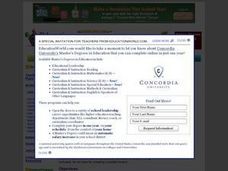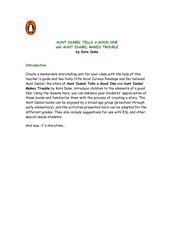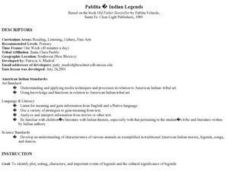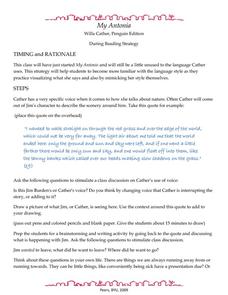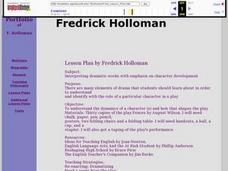Curated OER
Understanding Protagonists and Antagonists
How can you tell if a character is a villain? What about a hero? Work on literary analysis with an engaging language arts worksheet. After completing an activity about the four types of conflict, learners fill out a character map about a...
EngageNY
Grade 10 ELA Module 1: Unit 3, Lesson 5
Even the most rigid expectations come from a place of deeply held values. In a key chapter of Amy Tan's The Joy Luck Club, explore the ways that Jing-Mei's mother's parental expectations affect her relationship with Jing-Mei. Tenth...
Curated OER
Primary Sources and Protagonists: A Native American Literature Unit
Introduce your middle schoolers to the lives of past Native Americans. First, learners work together to put photographs in a sequence. Then, using their sequence, they create stories to share with the whole class. No matter how old your...
DeKalb County Schools
Compare/Contrast
A series of reading activities is sure to engage your young readers! Based on comparing and contrasting ideas, the packet provides opportunities to compare characters, themes, texts, and other elements of fiction.
Curated OER
Make Up Your Story
Putting together an interesting story can be hard, but this set of worksheets will guide your writers into the depths of their own creativity as they characterize both their main character and villain. Using humor to keep learners...
Prestwick House
Star Wars and the Hero's Journey
Is Luke Skywalker the archetype of a literary hero? Follow the path of the Hero's Journey with an engaging instructional activity that details the plot structure, applies it to Star Wars: A New Hope, and invites class members to choose...
Curated OER
Fortune Cookies Motivate Writing
Fortune cookies are used as motivation for a story. In this creative writing lesson, young writers review the six traits process. They discuss interesting characters, setting, problem and solution in a story. Original stories based on...
Curated OER
Aunt Isabel Tells a Good One...
Explore language arts by reading two similar stories in order to compare and contrast them in class. Young readers read two Aunt Isabel books, by Kate Duke, and discuss the main characters, plot, and setting. They complete a graphic...
Curated OER
Pablita Indian Legends
Scholars are introduced to the characteristics of a legend. They read and discuss Old Father Story Teller by Pablita Velarde. Then, in groups, they write and illustrate a poem based on one of the legends from the book. This lesson plan...
Curated OER
Introduction to Archetypes
Here is a full lesson with all the needed materials and PowerPoints attached! Introduce your class to archetypes by showing them the included presentation. The presentation gives definitions and examples of archetypal characters,...
Curated OER
An Introduction to The Catcher in the Rye
Who is J.D. Salinger? Give your class some information on the famous recluse before reading his only novel, The Catcher in the Rye. His life and works are detailed, and there are even a few slides dedicated to controversies and criticism...
Curated OER
My Antonia: During Reading Strategy
Home in on the quote on this page to explore setting, the author's and character's voices, and plot in Willa Cather's My Antonia. Pupils draw a picture of what is described in the quote, discuss the content, and make connections to their...
EngageNY
Grade 10 ELA Module 1: Unit 3, Lesson 2
Sometimes, sensory details can bring you back to a familiar place. Study the setting descriptions from a critical chapter in Amy Tan's A Joy Luck Club, and discuss how they enhance the book's plot and contribute to a central theme.
EngageNY
Grade 10 ELA Module 1: Unit 3, Lesson 4
Vivid quotes and strong sensory language compose Amy Tan's The Joy Luck Club, bringing the women to life as they navigate through issues surrounding identity and maternal relationships. Examine Waverly's relationship with her mother...
Curated OER
Responding to Literature
Your class will create a four section flip book and write titles for characters, setting, problem, and solution. They will also draw a picture to show what they wrote about.
Curated OER
Story Pyramids
Young writers generate descriptive words. They use pictures of various landscapes (from books, magazines, or the Internet) and complete a story pyramid. The pyramid (included here) asks to describe the main character, the setting, and...
Curated OER
Points of View
Cinderella is a classic love story when Cinderella is the protagonist—but what happens if a stepsister tells the story? Focus on point of view with a lesson about fairy tales and story elements. After reading a few familiar fairy tales,...
Texas Education Agency (TEA)
Archetypes, Motifs, and Plot in Drama (English II Reading)
The second interactive in a series of 10 introduces young scholars to character archetypes, archetypal plot patterns, and archetypal motifs, including the use of color. Learners read passages explaining the term and study examples from...
Orlando Shakes
Les Misérables: Study Guide
A writer has the responsibility to defend the less fortunate members of society. At least that was the view of Victor Hugo, author of Les Miserables. The novel is the subject of a study guide from Orlando Shakespeare Theater. Learners...
Curated OER
Interpreting Dramatic Works
Action! Delve into character development in the play Fences by August Wilson, setting the stage for learners to analyze character nuances. Thespians choose a scene from the script, responding with a written account of the character's...
Curated OER
Macbeth - Analyzing Characterization in Drama
The writing activity in this lesson could be used to assess student understanding of previously taught concepts of how language reveals character.
Curated OER
Evaluating a Book By Its Cover
Students practice using predictive strategies before reading a book. In this literacy lesson plan, students identify the theme and characters of the novel based on the cover illustrations.
Curated OER
Context Clues, Plot Structure, Conflict, and Personal Narrative Essay
What are the elements of a personal narrative? Get your class talking by reading "The Necklace" and "A Dangerous Game." The lesson focuses primarily on defining certain vocabulary terms (like context clues, plot, conflict, climax, etc.)...
Curated OER
Analysis of Character in a Short Story
Ninth graders examine a character from the short story, John Steinbeck's, "Flight." students respond to questions about the story and illustrate the character's journey.








